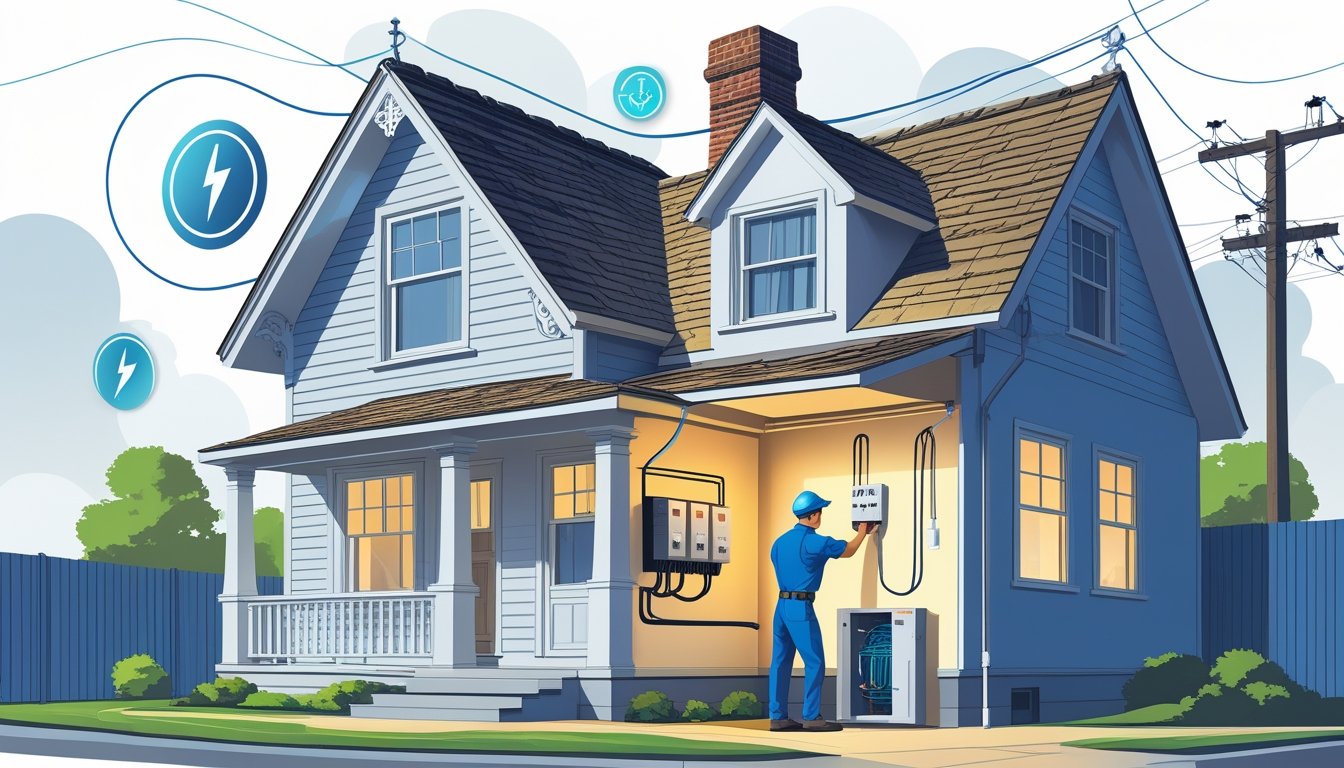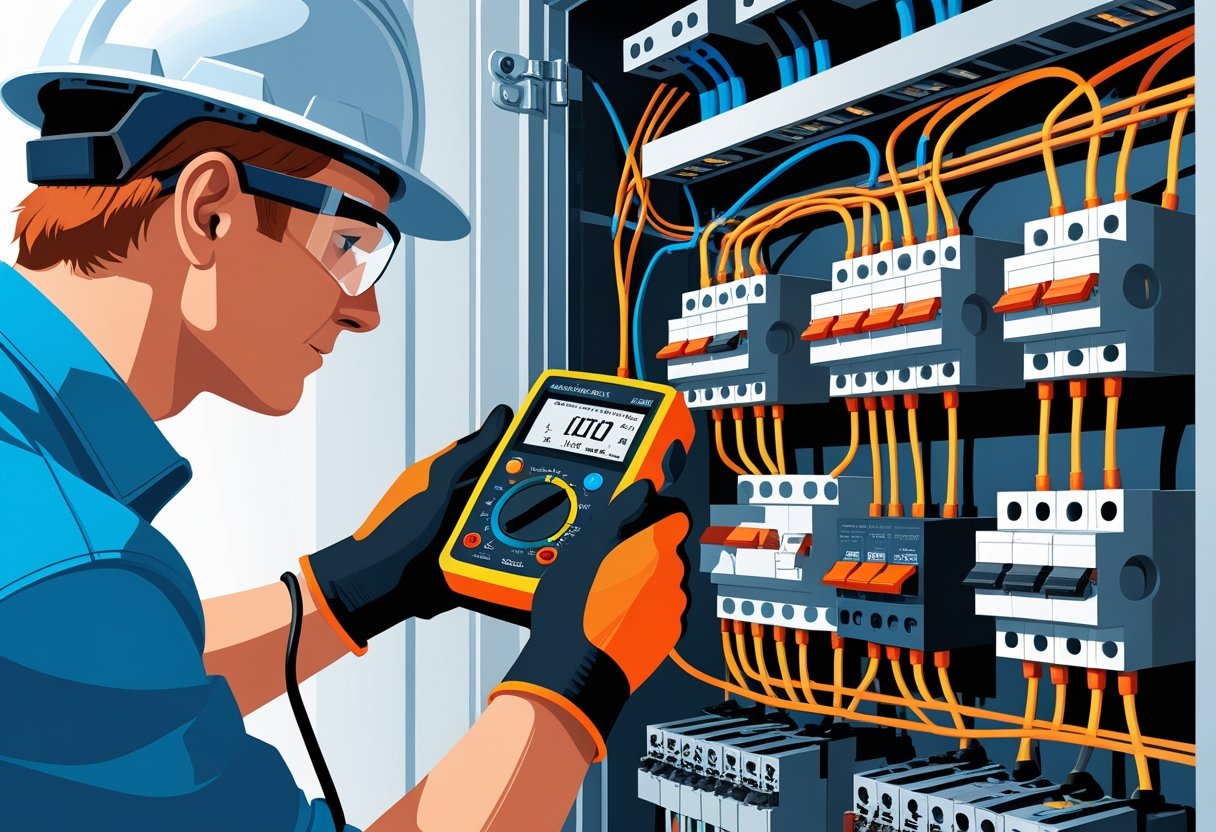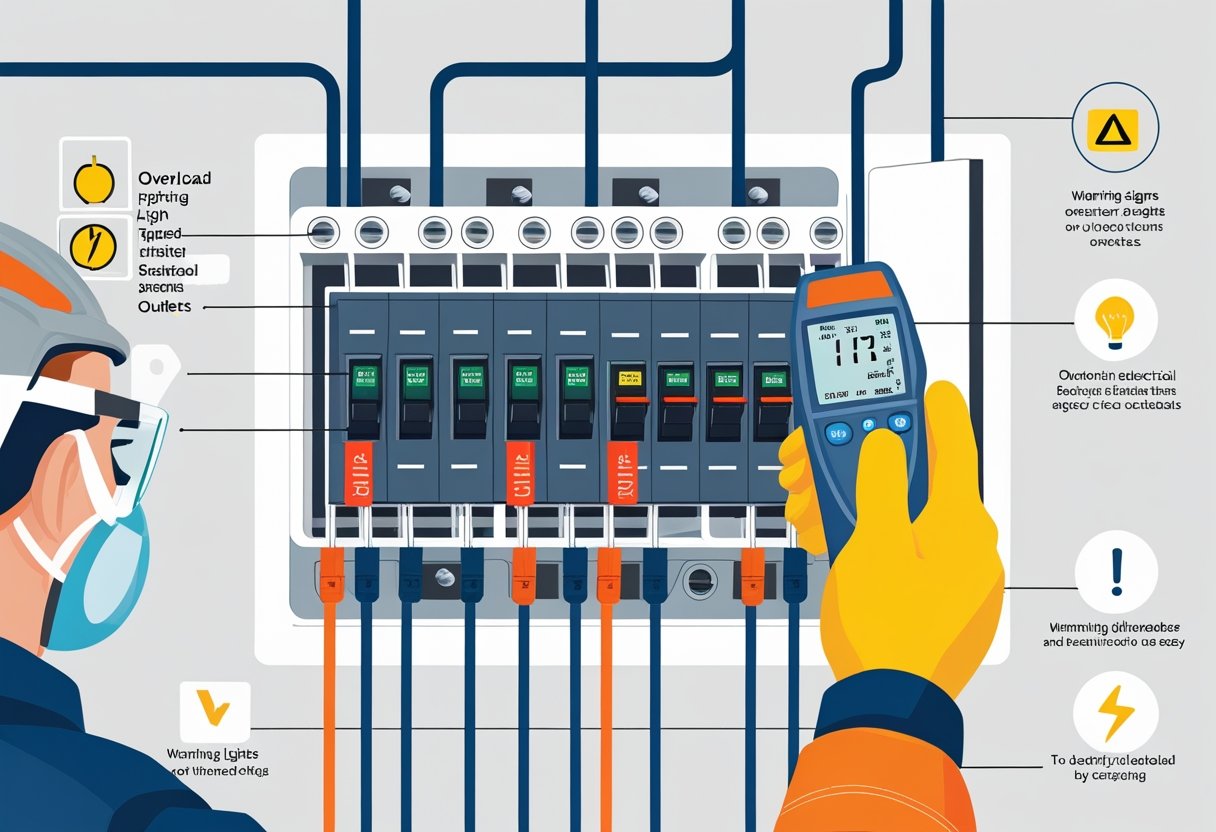If you need to replace a circuit breaker, knowing the cost upfront helps you plan better. The average cost to replace a circuit breaker usually ranges from $100 to $300, depending on the type of breaker and the electrician's fees in your area.
This helps you avoid surprises when budgeting for the repair. Costs can vary based on the complexity of the job and the breaker’s specifications.
Sometimes, just the breaker itself costs between $10 and $30, but labor and other factors add to the total price. Whether you’re doing a simple swap or upgrading your electrical panel, understanding these costs can save you time and money.
Replacing a breaker might sound tricky, but it’s a common repair that keeps your home safe and running smoothly. This guide breaks down the costs and steps clearly, so you feel confident moving forward.
Understanding Circuit Breaker Replacement Costs
Knowing what affects the cost to replace a circuit breaker helps you manage your budget. Prices vary based on the type of breaker you need, the work involved, and where you live.
You’ll also want to understand how different expenses add up.
Average Price Ranges
On average, replacing a circuit breaker costs between $100 and $375. This price usually covers both the breaker itself and the electrician’s labor.
The breaker part alone varies. A common 25 amp breaker might cost $10 to $30.
If you need a special type or brand, prices could be higher. Labor costs from a licensed electrician often make up most of the price.
Depending on your location and how tricky the replacement is, labor can cost $90 to $250 or more.
Breakdown of Typical Expenses
Your total cost breaks down mainly into two parts:
- Circuit breaker unit: $10 to $50, depending on size and type.
- Electrician labor: $90 to $325, depending on time and complexity.
Other expenses might include:
- Permit fees, required in some areas, costing $50 to $150.
- Troubleshooting or extra repairs if your wiring or panel has issues.
If you install the breaker yourself, you’ll only pay for the breaker. Hiring a pro is safer and could prevent bigger electrical problems later.
Factors Influencing the Total Cost
Several things affect how much you’ll pay:
- Type of breaker: Larger amps or special breakers cost more.
- Panel condition: Old or damaged panels need more work.
- Location: Labor rates differ across cities and states.
- Complexity: Hard-to-reach panels or extra wiring raise costs.
- Emergency service: Calling an electrician outside regular hours usually costs more.
- Permits: Some places require permits for electrical work, adding to costs.
Types of Circuit Breakers and Pricing
Circuit breakers come in different types based on their function and the level of protection they provide. Prices vary depending on the breaker’s design, amperage, and special features.
Knowing the differences helps you pick the right one for your needs and budget.
Standard Circuit Breakers
Standard circuit breakers protect your home from electrical overloads and short circuits. They are usually rated between 15 and 50 amps, depending on the circuit they serve.
The price for a basic standard breaker ranges from $10 to $30 for most models. Installation costs from an electrician can add $100 to $300 depending on where you live and the job’s complexity.
These breakers are usually easy to replace and widely available.
AFCI and GFCI Circuit Breakers
AFCI (Arc-Fault Circuit Interrupter) breakers detect dangerous electrical arcs that can start fires. GFCI (Ground Fault Circuit Interrupter) breakers protect against electrical shocks by monitoring ground faults.
These breakers offer extra safety for bedrooms, kitchens, and bathrooms. These specialized breakers cost more than standard breakers, typically between $40 and $100 each.
Their installation may also be more expensive because they require careful handling and testing. These breakers help meet current electrical codes and enhance your home’s safety.
High-Amp and Specialty Breakers
High-amp breakers handle large appliances or electrical systems with heavy power demands. Examples include 30-amp, 50-amp, or even higher rated breakers for air conditioners, electric ranges, or EV chargers.
Prices for these breakers start around $30 and can go above $100 for specialty models. Installation costs may rise due to the need for upgraded wiring or panel work.
Make sure you choose a breaker that matches your equipment’s power requirements to keep everything safe.
Labor and Professional Service Fees
When replacing a circuit breaker, you pay for both parts and the work done by a professional. Labor costs depend on the electrician’s hourly rate, minimum charges, and if you need service outside normal hours.
Knowing these details helps you budget better.
Electrician Hourly Rates
Electricians usually charge between $60 and $150 per hour for their work. Rates vary based on where you live and the electrician’s experience.
Simple breaker replacements may take about 1 to 2 hours, but complicated jobs can take longer. You can save money by hiring an electrician with clear pricing and good reviews.
Ask upfront about hourly rates before work begins. Some electricians include the cost of small parts in their hourly fee.
Minimum Service Charges
Many electricians have a minimum service fee that covers basic travel and inspection time. This fee usually ranges from $50 to $100, even if the job takes less than an hour.
You might pay the minimum charge for small jobs like replacing a single circuit breaker. Understanding this fee can help avoid surprises when you get the final bill.
Costs for Emergency or After-Hours Replacement
If you need urgent circuit breaker replacement, expect higher fees. Emergency or after-hours service often costs 1.5 to 2 times the normal hourly rate.
Electricians may add extra fees for nights, weekends, and holidays. Plan ahead when possible to avoid paying extra for emergency calls.
If you do need fast service, make sure you understand the total cost before work starts.
Signs Your Circuit Breaker Needs Replacement
Knowing when your circuit breaker is failing can save you time, money, and keep your home safe. Some clear signals show that your breaker is struggling.
Ignoring these signs can lead to bigger problems, so it pays to be aware of what to watch for.
Common Electrical Symptoms
If your circuit breaker trips often, that’s a warning sign. Flickering or dimming lights in your home might mean the breaker isn’t handling the load properly.
You could also smell a burning odor near the panel, which indicates overheating or damaged wiring. Another symptom is when a breaker won’t reset after tripping.
This could point to a short circuit or overload that your breaker isn’t able to protect against anymore. These issues show that the breaker might be old, worn out, or defective.
Risks of Delaying Replacement
Putting off replacing a bad circuit breaker can be risky. A faulty breaker might fail to stop a dangerous electrical current, increasing the chance of fires.
It can also cause damage to your home’s wiring and appliances. Delaying repairs can lead to more costly fixes down the line.
If your breaker keeps tripping and you ignore it, you might face a total electrical failure or even property damage. Acting quickly helps keep your home safe and avoids larger bills later.
Cost Differences: Single vs. Main Breaker Replacement
The cost to replace breakers varies based on whether you are fixing a single circuit breaker or the main breaker. Each has different parts, labor, and safety requirements that affect the price.
Replacing Individual Breakers
Replacing a single circuit breaker usually costs less because the process is quicker and needs fewer materials. The breaker itself might cost between $10 and $30, depending on the brand and amperage.
Labor for installing one breaker tends to run between $100 and $260. The exact price depends on how easy it is to access your breaker panel and the electrician’s rates.
You only replace individual breakers when they trip often or fail but the rest of the panel is in good shape. This makes it a cheaper fix for specific problems.
Replacing the Main Breaker
Replacing your main breaker is more complex and usually more expensive. The main breaker controls power for the entire panel, so it needs careful handling to avoid risks.
You can expect to pay around $150 to $300 or more for this replacement because it often involves shutting off power to your whole house during the work. Labor may cost more here, especially if your panel is older or not up to modern code.
Updating or bringing your panel up to code during this process may add to the cost. If your electrical panel is old, corroded, or can’t handle your home's power needs, replacing the main breaker is the safer choice.
Additional Costs and Upgrades
When replacing a circuit breaker, you might face extra expenses beyond just the breaker itself. These can include upgrading your electrical panel, fixing old or damaged wiring, and paying for permits and inspections.
Knowing these costs helps you plan your budget better.
Panel Upgrades
If your electrical panel is old or can't handle your home's power needs, upgrading it is often a good idea. Panel upgrades usually cost between $1,500 and $4,000.
Upgrading gives you more capacity for devices and appliances, and it lowers the chance of breaker trips caused by overloads. A bigger panel also improves safety and efficiency.
The exact cost depends on panel size and whether the upgrade requires extra parts or labor. Sometimes, a panel upgrade is the only way to fix frequent breaker trips.
Wiring Repairs
Old or faulty wiring can cause problems during a circuit breaker replacement. If the wiring is damaged, you’ll likely need repairs or replacements to make the system safe.
Wiring repairs vary in cost depending on how much work is needed. Simple fixes like tightening connections are cheaper.
But rewiring parts of your home can raise the price. It's important to address wiring issues because damaged wires can cause breakers to trip or even start electrical fires.
Your electrician will check for wiring problems and give you a cost estimate if repairs are needed.
Permit and Inspection Fees
Many areas require permits and inspections for electrical work, including breaker replacements. These fees can cost between $50 and $300, depending on local rules.
Permits are needed to show the work meets safety standards. After the job, an inspector will make sure everything was done right.
Skipping permits or inspections can cause problems later, like fines or issues when selling your home. Your electrician usually knows what permits you need and can help manage this part of the process.
DIY vs. Professional Circuit Breaker Replacement
Replacing a circuit breaker can save you money, but it also comes with safety concerns you should not ignore. Knowing when to do it yourself or call a professional helps protect your home and your wallet.
Safety Considerations
Working with electricity is risky. You must always turn off the main power before starting any work to avoid shocks.
Circuit breakers are part of your home’s electrical system, so mistakes could cause fires or damage. If you don’t have experience, improper wiring or installation could cause serious hazards.
Professionals have the tools and training to handle this safely. They also follow local codes, reducing risks of fire or legal issues.
If moisture, age, or damage caused the breaker to fail, a deeper electrical problem might exist. A pro can spot and fix these issues properly, keeping your home safe.
Potential Savings and Risks
Doing it yourself can cost around $10 to $30 for a 25-amp breaker. You save the labor charge, which might be $100 to $260 or more.
If you make a mistake, repair costs and dangers can add up quickly. Hiring an electrician costs more upfront but ensures the job is done right.
This can prevent frequent breaker trips or future expensive repairs. Insurance and warranty coverage sometimes require a licensed pro to work on electrical panels.
If your breaker trips often or your panel is old, replacing it is more than a quick fix. In that case, professional help is usually worth the peace of mind.
How to Save Money on Circuit Breaker Replacement
You can lower the cost of replacing your circuit breaker by being smart about who you hire and when you schedule the work. These steps help you avoid paying extra fees or rushing into repairs you don’t need.
Comparing Multiple Quotes
Before you pick an electrician, get at least three quotes. Ask for a breakdown of parts, labor, and any extra fees so you can compare clearly.
Look for electricians who include warranty coverage on their work. A warranty can save you money if something goes wrong after installation.
Don’t just choose the cheapest option. Sometimes a low price means lower quality parts or less experience.
Choose one with good reviews and fair prices. Use this checklist when reviewing quotes:
- Total cost (parts + labor)
- Warranty on parts and service
- Credentials and license status
- Estimated time for job completion
Choosing the Right Time for Replacement
Timing your replacement can affect the total cost. Scheduling during off-peak seasons, like early fall or late spring, often means lower labor costs.
If your breaker is still working but shows early signs of wear, replace it before an emergency happens. Emergency repairs usually come with higher fees.
You can also save by combining this job with other home electrical work. Electricians may offer a discount for multiple services on the same visit.
Wait for a convenient time when you can be home to supervise and communicate clearly with your electrician. This avoids misunderstandings and possible extra visits.
Long-Term Value of Replacing Circuit Breakers
Replacing circuit breakers can bring lasting benefits for your home. It affects both the safety of your electrical system and how well it works every day.
Impact on Home Safety
Old or faulty circuit breakers can fail to protect your home properly. When a breaker wears out, it might not trip during an overload or short circuit.
This increases the risk of electrical fires or damage to appliances. By replacing breakers on time, you make sure they respond correctly to electrical faults.
This reduces hazards and keeps your family and property safer. Signs that you need a replacement include frequent breaker trips, age over 10 years, or any visible damage.
Keeping your breakers in good shape helps you avoid dangerous situations before they start.
Boosting Electrical System Efficiency
A new circuit breaker works better with your home's wiring and devices. It can handle current loads more accurately and reduce unexpected power cuts.
Old breakers can cause nuisance trips, which interrupt your daily activities. When you replace them, the electrical system runs smoother, and devices get stable power.
Improved efficiency can also lower repair costs in your home’s electrical setup. Reliable breakers help detect problems early, stopping minor faults from turning into bigger issues.
Costs to consider:
Cost TypePrice Range Circuit Breaker Unit$100 - $260Installation$150 - $300
Frequently Asked Questions
Replacing a circuit breaker can cost different amounts depending on several factors. You’ll want to know what affects these costs so you can budget correctly and get a fair price.
How much should I expect to pay for a professional circuit breaker replacement?
You can expect to pay between $150 and $300 for a professional to replace a circuit breaker. This price usually includes both the part and labor.
Can the costs vary based on the type of circuit breaker I need?
Yes, the cost changes depending on the type and size of the circuit breaker. For example, a basic 25 amp breaker may cost around $10 to $30, while more advanced breakers can be pricier.
Are there additional factors that can affect the overall price of replacing a circuit breaker?
Other factors like the electrician’s fees, the condition of your electrical panel, and any needed wiring updates can affect the final cost.
Might my location influence the cost of circuit breaker replacement services?
Your location can impact prices. Areas with higher living costs or where electricians charge more may increase the total expense.
Is it more cost-effective to replace multiple circuit breakers at once?
Replacing multiple breakers at the same time might save you money on labor. This can be a good idea if your breakers are aging or showing signs of wear.
What should I look out for on a quote to ensure I'm not overpaying for circuit breaker replacement?
Check if the quote clearly lists parts, labor, and any extra fees. Avoid estimates that are too vague or unusually low.
Unclear or very cheap quotes might mean poor quality or surprise costs later.





